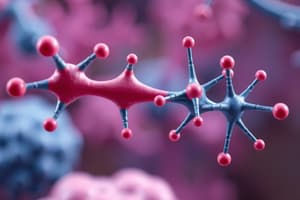Podcast
Questions and Answers
What distinguishes an antagonist from an agonist in terms of their effects on the body?
What distinguishes an antagonist from an agonist in terms of their effects on the body?
- Antagonists mimic the effects of agonists but with reduced efficacy.
- Antagonists only block small doses of agonists without any other action.
- Antagonists have no standalone effects and negate the actions of agonists. (correct)
- Antagonists enhance the effects initiated by agonists.
Which of the following statements about antagonists is accurate?
Which of the following statements about antagonists is accurate?
- Antagonists negate the effects of agonists by inhibition. (correct)
- Antagonists provide a blockade that can enhance the effect of agonists.
- Antagonists have physiological effects independent of agonists.
- Antagonists increase the concentration of agonists in the body.
How do antagonists function pharmacologically?
How do antagonists function pharmacologically?
- They enhance the binding of agonists to their receptors.
- They block the effect of agonists but can activate other pathways.
- They act similarly to agonists, promoting physiological activity.
- They reverse the action of agonists without having effects of their own. (correct)
What is the primary action of β-blockers in the body?
What is the primary action of β-blockers in the body?
What is a primary characteristic of an antagonist in the context of neurotransmission?
What is a primary characteristic of an antagonist in the context of neurotransmission?
What is a characteristic feature of competitive antagonists?
What is a characteristic feature of competitive antagonists?
Which of the following best describes the effects of an antagonist in pharmacology?
Which of the following best describes the effects of an antagonist in pharmacology?
Which statement accurately describes the mechanism of action for antagonists?
Which statement accurately describes the mechanism of action for antagonists?
Which of the following best describes the interaction between an agonist and its receptor?
Which of the following best describes the interaction between an agonist and its receptor?
What is the expected outcome when β-blockers are administered?
What is the expected outcome when β-blockers are administered?
Flashcards are hidden until you start studying
Study Notes
Antagonists and Their Effects
- Antagonists block or reverse the effects of agonists.
- They have no intrinsic activity; their effects stem from inhibiting agonist effects.
- Example: β-blockers inhibit the action of epinephrine and norepinephrine.
Mechanisms of Antagonists
- Competitively bind to the same receptor sites as agonists, preventing agonists from exerting their effects.
Drug Absorption and Distribution
- Orally administered drugs are absorbed through the gastrointestinal (GI) tract.
- Blood from the GI tract is processed by the liver, which metabolizes drugs.
- Bioavailability of oral medications is lower than intravenous (IV) administration; for example, bioavailability can be 75% for certain drugs.
Drug Clearance
- Total body clearance is the sum of clearances from various organs like the liver, kidneys, GIT, and lungs.
- Clearance is defined as the volume of plasma from which the drug is entirely removed in a specific time period.
Studying That Suits You
Use AI to generate personalized quizzes and flashcards to suit your learning preferences.



